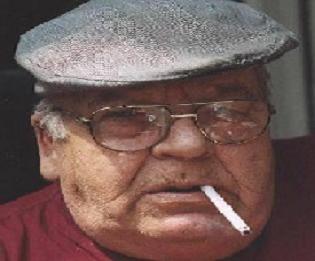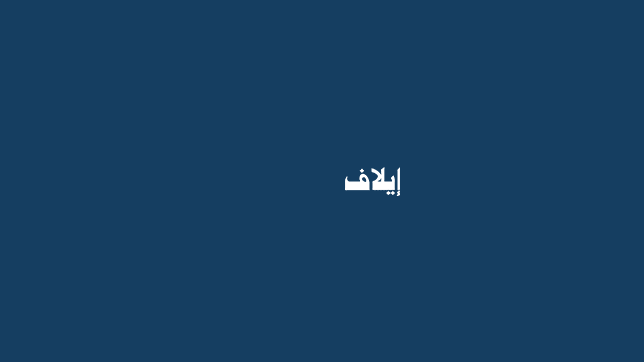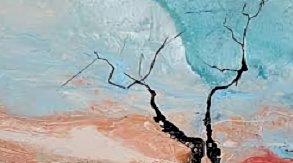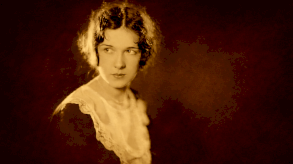Mohammed Al-Maghut or the muse in the slummiest parts of the language
Poet, playwright, and columnist, Mohammed Al-Maghut (1934 - 2006) is without a doubt the humblest and least pretentious of Arab poets. The more he refused to take part in the debates concerning techniques of innovation that Arab poets of the fifties were engaged in, the more he turned his back on the ephemeral glory those poets dreamt of, to the point from time to time of blowing their own trumpets. Al-Maghut does not eat from this bread. Reality is elsewhere. He wrote only to keep his dreams and  innocence united within one simple man: ldquo;I have neither money to invest nor land to cultivate, no deals to sign, nor a library to keep in order, no medals to show of, nor horse to ride, no cars to crash nor friendships to defend, neither an acceptable appearance to behold nor memories to seek refuge in. I have only the sadness which closes round my head like the talons of a vulture. I am only a poor and broken man . . .rdquo;. But Al-Maghutrsquo;s works were so rich in poetic vision that most of the new poets of the sixties and seventies were to find in that vision the expression of their own anguish and aspiration, to the extent that it could easily be said some of their poetry was in the style of Al-Maghut.
innocence united within one simple man: ldquo;I have neither money to invest nor land to cultivate, no deals to sign, nor a library to keep in order, no medals to show of, nor horse to ride, no cars to crash nor friendships to defend, neither an acceptable appearance to behold nor memories to seek refuge in. I have only the sadness which closes round my head like the talons of a vulture. I am only a poor and broken man . . .rdquo;. But Al-Maghutrsquo;s works were so rich in poetic vision that most of the new poets of the sixties and seventies were to find in that vision the expression of their own anguish and aspiration, to the extent that it could easily be said some of their poetry was in the style of Al-Maghut.
His three collections ndash; Huzn fi Dawrsquo; al-Qamar [Sadness in Moonlight, 1959], Ghurfa bi-malayin al-Judran [A room with Millions of Walls, 1964] and al-Farah laysa Mihnati [Joy is not my Profession, 1970], are suffused with deeply rooted images that burst, like flashes from a surrealist montage, from a memory rising up against taboos and injustice, images so powerful in their lyrical novelty that they became the highest praise for a past, simple and primitive life, remote from the modern town that ldquo;drowned in the floods of consumption and smokerdquo;. Most of his poems recall an early youth in Damascus ndash; ldquo;that pink carriage of prisonersrdquo;. One should not forget that al-Maghut not only was the first modern Arab poet to bring attention to the colourful complexities of this simple life but also introduced Arabic poetics to what I call stylistic savagery through his use of current and newly-coined words, indeed, sometimes even slang ndash; words juxtaposed in simple phrases creating a cadence previously unknown. In his poetry there are no references to the glories of the past, neither to Phoenician myths nor to Sufi or religious symbols ndash; which had dominated the movement of the then new metrical Arabic verse. On the contrary, to be liberated from all metrical codes, that is to ldquo;compose in the sequence of the musical phrase and not in sequence of a metronomerdquo; as Pound rightly put it, was for al-Maghut a chance to come to grips with the sound and fury of a fragmented present filled with sorrows, and to create his own profane and modern mythology of being in the world. Written during his exile in Beirut, his poetry ndash; which is among the pioneer works of non-metrical Arabic free verse ndash; is a cry in the jungle of language against the ruthless world of exile.
While it is true that Ounsi El Hage struck a blow at Arabic syntax which erupted as an earthquake in the semantics of poetic language, it is also true that in the poetry of al-Maghut the metrical expression of the masses, the we, was superbly replaced by the individual I. The really modern innovation in Arabic poetics, which demanded a veritable rupture with all the given forms of the past, in rhythm and composition, were brought about in the main by El Hage and al-Maghut. Both were able to present a new vision of life, an access to the Unknown, to new generations of poets.
Two plays, The hunchbacked Bird (1967), The Clown (1974), a novel, The Seesaw (1991), and two collections of his satirical articles gave new colour and dimension to his work, but in spite of the fact that al-Maghut has not published any poems since 1970, poetry remained the hidden passion of this clear-sighted man: ldquo;To be a great poet in the Arab world, one must be sincere; to be sincere one must be a free man; to be free one must live; and to live one must keep mum . . . You sicken me, poetry, you immortal and devine carrion!rdquo; (Abdul Kader El Janabi)
Weeping on a hunting trip
I would like to elegize upon that man.
Me the deformed and the ousted
In those cloudy countries
Where the horses neigh
And the moon rears like an animal
Outside of the fatherland
I would like to elegize upon that man
And carry his coffin like a cigarette in my hand.
For twenty years
I had seen him raising his braids with his hand
Waving his whip over our occupied territories
And his hunting dogs rattle with their metal collars
Inside a fog perforated by bullets.
I was a naive child
With viscous eyes
And hair flowing
Like wool over my shoulder
I used to sleep in trunks
Travel in the trucks
And climb the fir trees to the ridge,
In order to see the swollen roots of his hair
And the beaches of his mouth
To see his white jawbone,
While he is biting breasts and vegetables;
To see the love and the misery from high
I raise my trousers and whisper like a bird:
Lord,
I am bored, O lord.
Dispatch me with your goods
And your caps somewhere else
Write my name on the hooves of your horses.
Transport me like a storm over the rocks.
For the sands in my country cannot read.
And the dust does not like the eyes of the children.
He used to cry in winter,
Dance alone in the bitter cold
And look at our mothers and our sisters
Whose breasts were being pulverised by the crowd
I used to fear and adore him
While I was glancing at my beloved land
Leaping, laughing and suffering
Through the hooves and the bullet shells
A land as a white as the pomade
Full of horse dung, blood
And the drawers of weeping women
I used to fear and adore him
While he was climbing the hills violently like pirates
Leaving behind him his red mouth
Flitting like a butterfly over our grapevines
Over upside down hills, like tables
While waves of bedouins and blue troops
Were descending like a hurricane
Between rivers and black veils
Where crows weep
And the space is as dark as the mouth of a cannon.
I used to return alone to the desolated village
The hot sands burning my feet.
Bent behind the barbed wire
Raised like a rat on the ashes of the history
With the ink glinting like a knife between my teeth.
Why werenrsquo;t his trousers mine,
His hair and his whip?
Why werenrsquo;t his cattle mine?
And these drums?
He was from one of those vanished dynasties
That combed their hair in the narrow streets
And on the roofs of the hotels.
We, the dirty kids, used to adore him,
Put for him combs and mirrors
In the middle of the fields.
And take him money and meat
To the top of the mountains
And hersquo;d stretches his hand
Like the trunk of an elephant.
Absorbing everything:
The milk of the land, the harvest, the shops,
The yields of the children
And the pudding of the old men
Yet . . .
Joy was falling like rain in the forests
And Our land was crumbly like freshly baked biscuits
Green like oil
It bubbled with bravery, produce and weddings.
But . . . since this foreigner disappeared,
It became dark ruins
In which the wind whistled and the ravens cawed
Nobody would believe that he had died,
And that his gorgeous mouth
Was pulled from the earth with tongs
One would say in the zenith that his soul shivered
And that he was resting in the heavens
The way a butterfly rests on the ear of a child.
Peace be with you
O believing spirits, jalabia and old lights.
Peace be with you,
O vines whom treading and faith have worn to a splinter.
The Hill
Do not slap me, destiny,
Metres of smacks already cover my face.
Here I am, while the windrsquo;s blowing in the streets,
Charging out of books, taverns and dictionaries
The same way soldiers charge out of trenches.
O centuries, mean like an insect,
You who seduced me with a fan instead of a storm,
With matches instead of volcanos.
I will never forgive you.
I will return to my village, on foot if need be
I will spread, on my arrival, rumours about you.
I will lie down on the grass and beside the ditches
Like a knight exhausted after battle.
Like trained dogs leaping circles of fire
I will cross these gates and windows,
These sleeves and collars,
Flying like a hawk
Above the shyness of virgins
And the suffering of workers
At twilight spreading my wings like a swallow
In search of a virgin land that at the lightest touch
Of a cottage, a palace, an emir or a begger,
Will leap in the air like a wild horse
At the touch of a saddle,
A land that has not existed and will never exist
Except in my notebooks.
All right, century, you have defeated me,
But I will not find in all the Orient
A summit where I can hoist
The flag of my surrender.
A Bedouin in search of a bedouin land
O bed, cold and dark as the street,
I would so much like to split you with a pickaxe.
Where are the lips that I kissed ?
The breasts I caressed ?
It seems fate has pointed a revolver at my back
And skinned me in broad daylight.
Ah! I would so much like to wake up one morning
And see bars, schools and universities
Transformed into swamps, rotting mosses
And tents around of which dogs are barking,
And find cities, gardens and parliaments
Transformed into dunes of sands, wells from which
Nomads draw their water in leather buckets.
I would so much like to be at this instant
Feverish, in a lost village,
On an unknown bed,
Under an unknown roof
Where an old woman whom I have never seen
Will ask me,
As she soothes my forehead with her damp handkerchief:
ldquo;What country are you from, my son? ldquo;
And I will answer her, eyes full of tears: ldquo;Ah! Grandmother!rdquo;
The autumn of masks
O passers-by,
Empty the streets of all the virgins
And the veiled women.
I shall leave my house naked
And return to my forest.
In no way . . . In no way
I imagine myself
Other than a river in a desert,
A boat on a sea,
Or a monkey in a forest
Plucking green fruit
And throwing it over the heads of the strollers
While laughing and clapping his paws
As he swings from branch to branch.
I have no identity card in my pocket
Nor an appointment in my memory.
I never sat in a bar.
And never gallivanted
On the streets.
I am a child
I manage with difficulty
To stretch my body
To bury my baby teeth
in the cracks of the wall
I am an old man.
Age has given me a stoop
And passers-by offer me help.
I am an emir.
Here is my sword hanging
And my horse neighing on the hills.
I am a beggar.
I am sharpening my teeth on pavements
And follow passers-by from street to street
I am a hero . . . Where are my people?
I am a traitor . . . Where are my gallows?
I am a sole . . . Where is my road?
Stars and rains
In my mouth another mouth
Between my teeth other teeth.
O my parents . . . my people !
You who sent me into the world like a bullet,
Hunger, as a foelig;tus, palpitates in my guts.
I nibble my cheeks from inside.
What I write in the morning
Repulses me in the evening.
The one that I greet around nine orsquo;clock
I want to kill at ten orsquo;clock.
Irsquo;d like a flower as big as my face
And a wide hole between my shoulders
Let all my memories burst out like a spring.
My fingers annoy each other
And my eyebrows are two confronting foes.
I want to twist my body like a wire
In a very desolated cemetery,
And fall down a fathomless well
Full of monsters, mothers and bracelets.
I just forgot the shape of the spoon
And the taste of the salt.
I forgot the moonlight
And the smell of the children
My guts are full of cold coffee
And blind water
My throatrsquo;s crammed with scraps of paper
And blocks of ice
And you, stale water,
Fresh water . . .
You donrsquo;t know how much
I love you.
With stiff collars up to the chin,
And with sticky lips
And strictly buttoned wrists,
We eat standing up
We stand too long
We strike the flies
With poems and handkerchiefs
In order to see a tree or a bird passing by.
With merciless small feet we lean on the ground
And we throw the ribs of the village
From street to street.
I used to climb the spiral stairs
As clean as cotton,
Lustrous as the leaves of the myrtle.
I go up and down like a murdererrsquo;s dagger
With shoes of fame and shoes of hate
Hanging my misery on the nails of the wall,
Inserting my eyes penetrating deeply
Into distant balconies
And rivers returning from captivity.
I saw them all under the yellow sky.
The rich, the pacifists,
The poor and the monstrous.
I saw millions of teeth clicking in the street,
Millions of dim faces
Lowering their eyes under the thunder.
I saw hasty burials,
And the reins of barbaric horses burning in the streets
And workers falling from top floors
Buried carefully in the sad rain,
With their tobacco, their clothes,
And their mess tins.
But nothing is moving in the desert.
The wind whistles on the blood
And small tombs falling like dew
On hats and coats.
I saw canned breeze
And newspapers
(Bumped, or crashed against the rain.)
I drank dirty water
And licked the foam wherein was the blood of the breast
And I have never doubted this land
Which sleeps like a child,
This land which is mounded (bowed upward) like a butcher.
But through windows
And thousands of stars, corpses
And hammers of fire
I was looking for a mortal blow to my face
Looking for a small sea to use as shoes
And an arrogant meal
Which I could fold under my arm like a scarf.
I got tired of the long stairs
And the rooms of victory.
I would like to roast the corn
And in the sunset eat the stone and the pebble.
I want to embrace anything distant
Whether a wild flower
Or a muddied shoe as large as an eagle.
I want to eat, to drink, to die
And to sleep at the same moment.
I am in a hurry, in a hurry
Like a mangy cloud,
Like a lonely wave chased in the sea.
Translated from the Arabic by Abdul Kader El Janabi
ldquo;Weeping on a hunting triprdquo; and ldquo;Stars and rainsrdquo; are taken from
Ghurfa bi-malayin al-Judran, 1964.
ldquo;The Hillrdquo;,ldquo;A Bedouin in search of a Bedouin landrdquo;
and ldquo;The autumn of masksrdquo; are from al-Farah laysa Mihnati 1970










التعليقات